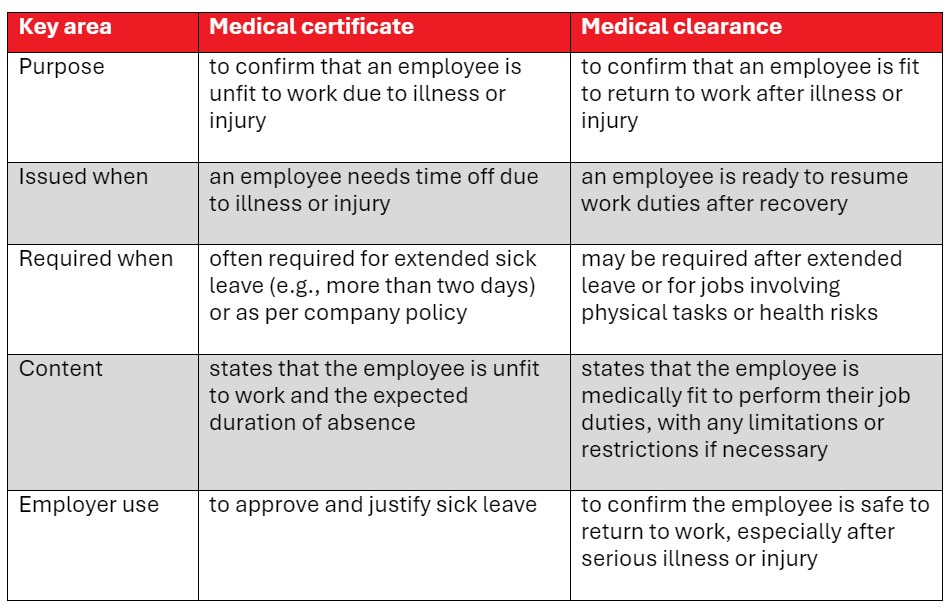
Find out the best practices for requesting a doctor's note from employees while balancing trust and privacy at work

HR managers might be reluctant to request a doctor’s note from an employee to justify time taken off work due to illness. For many, it can seem unnecessary, an invasion of privacy. It could be seen as inconsistent with building a culture of trust and mutual respect with workers.
And even if you do request a note – how much are you supposed to know about an employee’s medical condition? Where do you draw the line?
In this article, we’ll go over what you need to know when requesting a doctor’s note from an employee. We’ll discuss what’s allowed under the law as evidence for taking sick leave. We’ll show how a doctor’s note – or more accurately, a medical clearance – can help employers comply with workplace health and safety and disability laws.
Under the Fair Work Act, you can ask an employee for evidence that they took sick leave. This is usually done when:
Acceptable evidence could be:
The Fair Work Ombudsman says that employers can ask for evidence for 1 day of work or less.
Employee obligations for providing a doctor's note are outlined in workplace policies such as:
In managing an employee’s absences, you’ll need to follow requirements set out in these guidelines.
Aside from the two reasons we stated earlier, you can also ask for a doctor’s note in these cases:
If you see a pattern in attendance that points to a concern with an employee’s health, ask for a doctor’s note. This way, team leaders have the information to manage the employees and their workload, making any adjustments if needed.
Should the absences lead to a legal case, you have proof of every relevant instance of medical absence.
A valid doctor’s note should have this information:
A doctor’s note would not have details of the patient’s condition to respect their privacy.
If the employee consents, the medical professional can provide more information about the employee’s illness or injury to the employer.
If an employee fails to show a medical certificate, a statutory declaration is also an option. Under the Fair Work Act, the employee should present evidence to convince a reasonable person that they are entitled to sick leave.
If an employee doesn’t produce any of the evidence stated above, they are not entitled to paid sick leave.
Full-time employees are given 10 days of sick/carer’s leave each year. This is pro-rated for part-time employees. Unused sick/carer’s leave can be carried over to the next year.
Common practice involves allowing up to 2 straight days of sick leave without need for a doctor’s note. The truth is, under the Fair Work Act, employers can ask for a doctor’s note for a day or less of sick leave.

There are advantages to allowing up to 2 days of sick leave without requiring a doctor’s note:
Your company guidelines and the employment contract should outline what the policy is for taking sick leave.
Yes, an employer can ask for medical clearance to find out if the employee is well enough to return to work. Details in the medical clearance can help you decide what adjustments can be made to support your employee when they return to work. This meets your duty of care obligations as an employer.
A medical clearance is different from a medical certificate or doctor’s note. Apart from the details that a doctor’s note would usually have, a medical clearance would also include:
Here’s a summary outlining the differences between a medical certificate and medical clearance:
 Can my employer ask why I am sick in Australia?
Can my employer ask why I am sick in Australia? This is a tricky area. Employees do not have to share details of their medical condition, but employers have obligations under law to accommodate any disabilities.
In certain situations, employers can ask employees for more information. It’s also an option to request a third-party medical exam. This is to help you meet your duties under law covering these areas:
If you want to speak to the employee’s doctor, get consent from the employee first. All sensitive medical information should be kept strictly confidential and not disclosed to other employees.
Balance the need for getting the required information and respecting your employee’s right to privacy. For legal advice in this area, contact one of the employment law firms listed on our best HR service providers page.
Employers in Australia have an obligation to treat mental health conditions seriously. When an employee hands in a medical clearance outlining their mental health condition, employers must comply with the Fair Work Act and the Privacy Act.
Here are points to keep in mind when supporting a colleague with a mental health condition:
Mental health conditions like anxiety or depression are legally protected in Australia.
Section 351 of the Fair Work Act 2009 outlines protected attributes, one of which is mental disability. The Act says that employers must not take ‘adverse action’ against an employee because of any of these attributes.
Adverse action could mean:
Requesting a doctor’s note or medical clearance can help you take a more measured approach when dealing with absences or a dip in performance.
Mental conditions are considered disabilities under the Disability Discrimination Act (DDA) of 1992. Under section 30, requests for information (such as requesting a doctor’s note) are justified if:
Some of these reasonable adjustments include:
Find out how work design can help manage psychosocial risks in our special report.
Managing psychosocial risks at work is required by WHS laws.
— Safe Work Australia (@safe_work_aus) August 25, 2023
Download our model Code of Practice, Managing psychosocial
hazards at work, today- https://t.co/hX4ODVOcXT pic.twitter.com/AwjHiuk4Zs
Finally, section 19 of the Work Health and Safety (WHS) Act describes an employer’s duty of care to its employees. Employers must:
Requesting a doctor’s note (or medical clearance, depending on the situation) helps you meet your obligations under the WHS Act. A doctor’s note or medical clearance helps you:
At the heart of every HR transaction, including requesting a doctor’s note from employees, is the need for privacy. Any information in a doctor’s note or medical clearance is sensitive. This should be handled discreetly.
Medical clearance documents might include recommendations for gradual return-to-work plans. You can help with this through one of these adjustments:
Check the Fair Work Act and the WHS Act for guidelines.
Sharing clear guidelines on sick leave is important in managing employees’ expectations around leave entitlements. Here are a few points to keep in mind:
1. Have clear company policies on sick leave. These should include guidelines on when to request doctor’s notes from employees. The process should be clear and simple to avoid confusion. Share them across the organisation via handbooks, the intranet, or by email.
2. Make policies visible. Key HR policies, especially those on sick leave, should be visible and easy to access. Consider using HR tools to help employees track their leave entitlements. Read our special report on the best HR vendors in Australia and New Zealand to make your choice.
3. Share updates and reminders. This is especially important when new laws or changes to existing laws are introduced. Update company policies regularly. Share updates during onboarding, team meetings, or via HR newsletters/emails.

4. Raise awareness through training. Offer sessions for employees and managers on company policies, including those on sick leave. Highlight why these policies are important and how they comply with Australian laws.
There are workplace safety guidelines and privacy laws to consider when requesting a doctor’s note from an employee. Here are some resources to keep your actions and decisions aligned with Australian legislation:
1. Fair Work Ombudsman is Australia’s workplace regulator. It is the authority when it comes to ensuring that all workplaces are equal and fair. Their website has detailed guides, tools, and resources on leave management and compliance with medical certificate requirements.
2. Safe Work Australia provides mental health resources and guidelines for workplace health and safety.
3. Employee Assistance Programs (EAPs) provide confidential counselling and support for staff facing health challenges. It’s a useful resource; according to a 2022 report, 80% of Top 500 companies in Australia have an EAP in place. The same report cited an effectiveness rate of 84%.
4. Legal and HR consultants can help with policy drafting and compliance, making sure that you’re legally covered. These consultants can also help manage complex cases.
5. HR technology can help streamline leave management and perform other HR functions. We shared a list of award-winning HR tech earlier; to expand your options, visit our HR software reviews section.
Employees in Australia are entitled to sick leave or carer’s leave by law. While it’s common to request a doctor’s note after two consecutive days, the Fair Work Act allows employers to ask for a doctor’s note at any time.
Beyond verifying sick leave, requesting a doctor’s note or medical clearance helps employers make reasonable adjustments for their staff. This ensures compliance with health, safety, and disability laws.
Sick leave and doctor’s note requirements should be clearly outlined in company policies. These would help show that requesting a doctor’s note from an employee is more than an admin task. It’s also about keeping everyone at work healthy and safe.
What’s your organisation’s best practice on requesting a doctor’s note from an employee? Let us know in the comments below